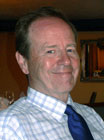


Edward Marston: past, present, fact, fiction
Excerpt from the interview by Virginia R. Knight in the April/May 2007 issue of Mystery News
When I was researching Edward Marston in preparation for this interview, I had already read several of his Nicholas Bracewell mysteries, which I enjoyed thoroughly. I had heard him speak at least once at a mystery convention, so I knew he was charming and articulate. I knew that Marston was a pseudonym and that he had a theatrical past. That was pretty much the extent of my knowledge...
Virginia R. Knight: My first question to you was going to be "Have you always been interested in history?" Then I went to your web site and saw that you read Modern History at Oxford and then lectured in the subject for three years. I was more familiar with your theatrical past than your teaching past...
Instead I will ask, "Do you have a favorite period about which you write?" So far, you've written about Elizabethan theater, the Restoration and its architecture, the Victorian railways, Edwardian ocean travel and crimes, as well as America and architecture in the 1930s and contemporary professional golf! That is quite a range of interests.
I ask that question with the knowledge that this might be similar to asking an author which is his favorite book or asking a parent to name the favorite child.
Edward Marston: My favorite period is the one I'm engaged on at any given moment. What I enjoy most is the research when I can lose myself in a different age and sift through its statutes, documents, letters, diaries, art, literature, poetry and so on to dig out those telling details that can enliven a narrative. As a way of catching mood and tempo, I also listen to the music from any period about which I'm writing...
VRK: Have you always enjoyed mysteries or crime novels? Mystery readers well understand that reading them is far easier than writing them. What drew you to writing crime novels?
EM: Yes, I've always enjoyed reading mysteries. My father used to borrow thrillers from the library and I developed a taste for them at young age. They always seemed to have so much color and action. I grew up in a high-crime area and saw a lot of violence, drunkenness and petty crime on a regular basis. Our next-door neighbor was in and out of prison all the time and there were other known crooks nearby. Most people were, in fact, very law-abiding and you learned to live with the smattering of villains. Twenty years after I'd left South Wales, one of my closest childhood friends hacked his father to death with an axe. He is now serving a life sentence. Another of those childhood friends is now in the House of Lords, proving that it was possible to make good from the same deprived background.
When I left Oxford, I had a part-time job teaching drama at a prison in Birmingham. It was an education in every sense. For many years, I played rugby for a team of Welsh exiles and the majority of our players came from Birmingham City Police Force so I was hearing about crime from both sides of the law. Given this background, it was inevitable that I should want to write about crime. Since I'd been a history lecturer, I soon veered towards mysteries with an historical element.
Read the complete interview in the April/May 2007 issue of Mystery News